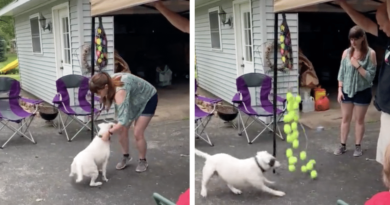When Your Dog Hurts, What Should You Do?
A few weeks ago I shared that my 14-year-old mixed-breed, Otto, was showing signs of age-related dementia. He’s also showing more discomfort related to his osteoarthritis. The post struck a chord with more than a few readers, and many of you mentioned things that had worked for your own dogs in the past, or a dog you knew. The suggestions included:
- Crating at night
- Herbal remedies, including California Poppy, Passionflower, and Chamomile
- Selegiline (generic name of Anipryl; prescription medication)
- Lions Mane (mushroom-sourced supplement)
- Aromatherapy
- Adaptil collar
- CBD chews (supplement)
- NaturVet’s Emotional Support (supplement)
- acetyl l-carnitine and alpha lipoic acid (supplements)
- Cholodin (supplement)
- Clomicalm (prescription medication)
- MCT oil (supplement)
- Melatonin (supplement)
- Trazodone (prescription medication)
- Purina’s “Bright Minds” food
- A night light
- SAM-e (supplement)
I appreciate every single one of these suggestions, and am glad that dogs have been helped by these things. At the same time, the list highlighted the helplessness that any of us may experience at a time when our beloved dogs have a chronic or ambiguous health issue. How the heck does one decide? You can’t do it all; it’s not fair to turn your dog into a chemical science experiment. Plus, if you are using multiple treatments, and your dog’s condition improves, do you know which thing helped? Do you keep doing all the things?
Important note: Anything you do has to start with your veterinarian. Just randomly adding things without knowing what’s wrong (or, at least, what’s not wrong) is irresponsible. It would be awful to learn, after you’d been giving your dog all sorts of various supplements and remedies that he had undiagnosed and untreated cancer, for crying out loud. We’re many thousands of dollars into Otto’s medical surveillance, including frequent blood and urine tests, x-rays, and abdominal ultrasounds – he even had an MRI a few years back, when he had a (fortunately benign) mass removed from his liver – and thank goodness AGAIN that I’ve been investing in Otto’s health insurance for many years.

I’m assuming that your vet is included in the discussion of “What can I do for my dog?” and you’re still at a loss – and I mentioned this specific frustration to my own vet, while she was treating Otto with acupuncture. She mentioned a couple treatments that helped her own senior dog who had dementia in that dog’s last years of life. I asked her, as a general question, “When there are so many options, where does a dog owner start? How do you know what to do?”
She answered, as I would expect a veterinarian would, “Ask your vet!” And I agree! And yet, in this very specific case, I have been asking a vet, three of them, in fact. Including her! And we’ve tried a few things without any of them making an appreciable difference.
My personal tactic is to try something for a minimum of a month; I’ve tried a couple more things for two or even three months when I was told that it takes time to see an effect. But if I see no effect whatsoever – if Otto’s behavior and gait absolutely do not improve in any way that I can see, I stop that particular supplement or treatment and try something else.
The one thing I know works for Otto’s osteoarthritis pain is a prescription nonsteroidal anti-inflammatory drug, Galliprant. I’ve also tried gabapentin and Trazodone, which both have been recommended for pain as well as the sleeplessness Otto often displays at night. I also tried a month’s worth of SAM-e. I’ve stuck with the gabapentin the longest, but honestly, I don’t think it’s doing anything. I’m currently weaning him off of it, without seeing any decline or difference at all.

I recently bought a CBD product to try on Otto (after researching an article on how to choose a CBD supplement and writing an article about this, which will appear in the April issue). At his next acupuncture appointment next week, I’m hoping to pick up selegiline to give that a try. We discussed it at our last appointment, and I’ve left a phone message for the vet mentioning that I want to try it next.
The hard fact is, we can’t fix everything our dogs are suffering from with a pill or treatment – but because we can fix or improve many things, and because we love them, we remain hopeful.
Also – and I’m as guilty as anyone of this – it’s often easier to hope you can fix everything that’s wrong with a pill or supplement than it is to simply slow down and spend more loving time with our senior friends – to do more hands-on massage, gentle grooming, extra nail trims, and just being present with them. Writing this has helped me realize I need to do of more just that, and a little less fretting about the next pill to try.





Online shopping allows me to consider benefit of early-bird holiday sales without the rush. Best sellers 2023 products